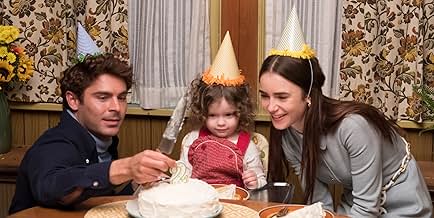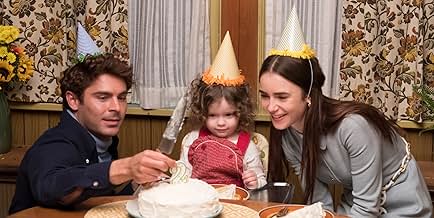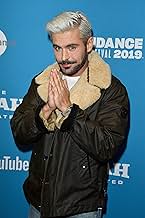Ted Bundy: A Irresistível Face do Mal
Título original: Extremely Wicked, Shockingly Evil and Vile
Um frenesi de sala de audiências segue e varre a América dos anos 70 quando uma jovem mãe solteira conhece Ted Bundy.Um frenesi de sala de audiências segue e varre a América dos anos 70 quando uma jovem mãe solteira conhece Ted Bundy.Um frenesi de sala de audiências segue e varre a América dos anos 70 quando uma jovem mãe solteira conhece Ted Bundy.
- Direção
- Roteiristas
- Artistas
- Prêmios
- 5 vitórias e 5 indicações no total
Alan B. Jones
- Utah Judge Stewart Hanson
- (as Alan Bomar Jones)
- Direção
- Roteiristas
- Elenco e equipe completos
- Produção, bilheteria e muito mais no IMDbPro
Avaliações em destaque
Directed by Joe Berlinger immediately after completing work on Conversando com um Serial Killer: Ted Bundy (2019), Extremely Wicked, Shockingly Evil and Vile is worth seeing for Zac Efron's performance, but is a strangely muted affair, neither ghoulish warts-and-all carnage nor restrained psychological treatise. Telling the story of Ted Bundy from the perspective of a woman who was oblivious to his true nature is an interesting narrative choice, and had Berlinger stuck to this format, it could have made for a fascinating film. However, the longer it goes on, the more it seems to revel in Bundy's flamboyance, and what begins as an intriguing insider's look at living with a killer soon shifts into an underwhelming courtroom drama, only returning to its original tone in the final (fictional) scene.
The film begins in 1969, the night Bundy (Efron) and Elizabeth Kendall (Lily Collins) first met in a Seattle bar. As a single mother with a low-paying job, she is surprised to find this charismatic, handsome, and intelligent law student so interested in her, but interested he is, with the duo quickly falling in love. However, six years later, when he is stopped in Utah for a minor traffic violation, the police find ropes, handcuffs, ski mask, leather gloves, and a crowbar in his car, and he is subsequently charged with and convicted of attempted kidnapping. He vehemently protests his innocence to Liz, and although concerned, she accepts his explanations. However, as police departments across California, Oregon, Washington, Idaho, Utah, Colorado, and Florida start to connect him to a string of recent murders, it becomes harder and harder for Liz to deny there's more to her boyfriend than she ever imagined.
Very loosely based on Liz Kloepfer's memoir, The Phantom Prince: My Life With Ted Bundy (1981), Extremely Wicked was written by Michael Werwie. The hook for the original script was that the audience is unaware the character is Bundy; the film was written as a supposedly fictional story of a young couple whose life is shattered when he is accused of multiple murders, with his real identity only coming as a final act twist. As Berlinger was completing The Ted Bundy Tapes, the script was offered to him, and although he found the twist distasteful, he loved the idea of looking at the Bundy story through the eyes of someone who thought him to be innocent.
One of the biggest appeals of the movie, of course, is the unexpected casting of Zac Efron as Bundy (Efron also serves as executive producer). And it has to be said, he's excellent. Although he doesn't really look like Bundy, he has the mannerisms down to a tee. Especially if you watch the film after the docu-series, you'll really pick up on the depth of the performance; Efron's every movement and gesture, the way he smiles, the way he stands, the tone of his voice, everything is perfect. Of course, Bundy's good looks and charisma were his most formidable weapons as he proved that evil could fester under an attractive façade, and this gives Efron room to manoeuvre, playing every scene in such a way that the subtext is always apparent, although never allowing Bundy's mask to slip. Indeed, it's the absence of any obvious monstrousness in the performance which is so unnerving.
One of the film's most notable components is that, apart from one brief scene near the end, there is no depiction of violence. As Liz's story, the idea is to present Bundy not with the 20/20 hindsight of history, but with the same degree of ambiguity with which she would have viewed him. It's an interesting way into the story and seems a genuine attempt to do something more than simply reproduce the salacious details of the crimes. Of course, if you're making a film about a serial killer which doesn't feature much in the way of serial killing, you're going to need to fill it with something, and in this sense, Berlinger focuses, at least in the first half, on how a killer can lie and manipulate, coming across as completely normal to all who know him. Berlinger has said that the film is about the mechanics of how a person can be "seduced by someone capable of evil", and it was his intention that the audience actually like Bundy, as he wanted them to feel disgust with themselves - just like Liz, he wanted them to be seduced by evil.
However, as admirable as this approach is, the film has a lot of problems. For one thing, because it depicts Bundy not as we now know him but as his contemporaries saw him, it means we only see the performative side, never the monstrous underbelly. Sure, this means that the film avoids exploitation, but in doing so, it could be accused of sanitisation (to be fair, this is something of a damned if you do, damned if you don't scenario - show the murders and you're exploiting real-life suffering, don't show them and you're hiding the true nature of his crimes). And granted, portraying him as a possibly innocent man is part of the attempt to explain how Liz could be duped, but all the good intentions in the world don't change the fact that the film's Bundy is a lovable rogue who bites his thumb at the system, not a murderer, a man who raped and butchered a 12-year-old child, and who decapitated multiple women and had sex with their corpses.
I understand that Berlinger wants to depict how Liz could have been blinded by devotion to a man that she thought (correctly, as it turned out) was too good to be true. But the problem is that she herself is never characterised enough for this to work; everything we learn about her is predicated on her relationship with him - there's nothing about her life prior to meeting him, and what we learn about her life after he was convicted is primarily fictional. Additionally, the focus shift halfway through as the film transitions from Liz as subjective focaliser to a more objectively focalised courtroom drama makes very little tonal sense. It's almost as if Berlinger loses interest in Liz when the sensationalist trial begins. This transition reduces Liz to a cycle of watching the trial, crying, doubting his guilt, drinking, watching the trial, crying etc, as she's effectively stripped of what little agency she had in the first half.
Another problem is that we learn nothing new about Bundy himself; there's nothing about his childhood, for example, or how he got away with the murders for so long, whether he really loved Liz, or if he genuinely lacked the ability to feel empathy. Along the same lines, we learn nothing whatsoever about the victims. This was also a problem in the docu-series, but it's far more pronounced here, and because of this, the decision to put the names of his known victims on screen at the end of film is unearned, crass, and meaningless.
The film also makes some strange changes to documented fact, many of which seem designed to make Bundy more sympathetic. For example, there's no mention of the fact that he tried multiple times to pressure Liz into rough sex, particularly choking. Another scene sees him forcibly restrained in his cell whilst a dentist takes impressions of his teeth. In reality, the impressions were taken in a dentist chair, and Bundy quite happily allowed the dentist to work. The film also shows him continuing to try to contact Liz throughout his incarceration. In reality, however, he lost contact with her in the early 80s, and there's no evidence he tried to find her.
Extremely Wicked, Shockingly Evil and Vile is by no means a bad film. But it could have been so much better. The shift from subjective focalisation to court-room drama makes very little sense, and fundamentally undermines what Berlinger seems to have been trying to do. The film initially looks at how evil can hide in plain view, creeping into our lives under the guise of normalcy, but Berlinger allows this theme to recede into the background as he hands the narrative over to Bundy. If this was supposed to be Liz's story, Berlinger takes his eye off the ball badly. And although the film certainly doesn't sympathise with Bundy, and although the decision not to show any of the murders is commendable, the fact is that, yet again, Ted Bundy has become very much the star of his own show.
The film begins in 1969, the night Bundy (Efron) and Elizabeth Kendall (Lily Collins) first met in a Seattle bar. As a single mother with a low-paying job, she is surprised to find this charismatic, handsome, and intelligent law student so interested in her, but interested he is, with the duo quickly falling in love. However, six years later, when he is stopped in Utah for a minor traffic violation, the police find ropes, handcuffs, ski mask, leather gloves, and a crowbar in his car, and he is subsequently charged with and convicted of attempted kidnapping. He vehemently protests his innocence to Liz, and although concerned, she accepts his explanations. However, as police departments across California, Oregon, Washington, Idaho, Utah, Colorado, and Florida start to connect him to a string of recent murders, it becomes harder and harder for Liz to deny there's more to her boyfriend than she ever imagined.
Very loosely based on Liz Kloepfer's memoir, The Phantom Prince: My Life With Ted Bundy (1981), Extremely Wicked was written by Michael Werwie. The hook for the original script was that the audience is unaware the character is Bundy; the film was written as a supposedly fictional story of a young couple whose life is shattered when he is accused of multiple murders, with his real identity only coming as a final act twist. As Berlinger was completing The Ted Bundy Tapes, the script was offered to him, and although he found the twist distasteful, he loved the idea of looking at the Bundy story through the eyes of someone who thought him to be innocent.
One of the biggest appeals of the movie, of course, is the unexpected casting of Zac Efron as Bundy (Efron also serves as executive producer). And it has to be said, he's excellent. Although he doesn't really look like Bundy, he has the mannerisms down to a tee. Especially if you watch the film after the docu-series, you'll really pick up on the depth of the performance; Efron's every movement and gesture, the way he smiles, the way he stands, the tone of his voice, everything is perfect. Of course, Bundy's good looks and charisma were his most formidable weapons as he proved that evil could fester under an attractive façade, and this gives Efron room to manoeuvre, playing every scene in such a way that the subtext is always apparent, although never allowing Bundy's mask to slip. Indeed, it's the absence of any obvious monstrousness in the performance which is so unnerving.
One of the film's most notable components is that, apart from one brief scene near the end, there is no depiction of violence. As Liz's story, the idea is to present Bundy not with the 20/20 hindsight of history, but with the same degree of ambiguity with which she would have viewed him. It's an interesting way into the story and seems a genuine attempt to do something more than simply reproduce the salacious details of the crimes. Of course, if you're making a film about a serial killer which doesn't feature much in the way of serial killing, you're going to need to fill it with something, and in this sense, Berlinger focuses, at least in the first half, on how a killer can lie and manipulate, coming across as completely normal to all who know him. Berlinger has said that the film is about the mechanics of how a person can be "seduced by someone capable of evil", and it was his intention that the audience actually like Bundy, as he wanted them to feel disgust with themselves - just like Liz, he wanted them to be seduced by evil.
However, as admirable as this approach is, the film has a lot of problems. For one thing, because it depicts Bundy not as we now know him but as his contemporaries saw him, it means we only see the performative side, never the monstrous underbelly. Sure, this means that the film avoids exploitation, but in doing so, it could be accused of sanitisation (to be fair, this is something of a damned if you do, damned if you don't scenario - show the murders and you're exploiting real-life suffering, don't show them and you're hiding the true nature of his crimes). And granted, portraying him as a possibly innocent man is part of the attempt to explain how Liz could be duped, but all the good intentions in the world don't change the fact that the film's Bundy is a lovable rogue who bites his thumb at the system, not a murderer, a man who raped and butchered a 12-year-old child, and who decapitated multiple women and had sex with their corpses.
I understand that Berlinger wants to depict how Liz could have been blinded by devotion to a man that she thought (correctly, as it turned out) was too good to be true. But the problem is that she herself is never characterised enough for this to work; everything we learn about her is predicated on her relationship with him - there's nothing about her life prior to meeting him, and what we learn about her life after he was convicted is primarily fictional. Additionally, the focus shift halfway through as the film transitions from Liz as subjective focaliser to a more objectively focalised courtroom drama makes very little tonal sense. It's almost as if Berlinger loses interest in Liz when the sensationalist trial begins. This transition reduces Liz to a cycle of watching the trial, crying, doubting his guilt, drinking, watching the trial, crying etc, as she's effectively stripped of what little agency she had in the first half.
Another problem is that we learn nothing new about Bundy himself; there's nothing about his childhood, for example, or how he got away with the murders for so long, whether he really loved Liz, or if he genuinely lacked the ability to feel empathy. Along the same lines, we learn nothing whatsoever about the victims. This was also a problem in the docu-series, but it's far more pronounced here, and because of this, the decision to put the names of his known victims on screen at the end of film is unearned, crass, and meaningless.
The film also makes some strange changes to documented fact, many of which seem designed to make Bundy more sympathetic. For example, there's no mention of the fact that he tried multiple times to pressure Liz into rough sex, particularly choking. Another scene sees him forcibly restrained in his cell whilst a dentist takes impressions of his teeth. In reality, the impressions were taken in a dentist chair, and Bundy quite happily allowed the dentist to work. The film also shows him continuing to try to contact Liz throughout his incarceration. In reality, however, he lost contact with her in the early 80s, and there's no evidence he tried to find her.
Extremely Wicked, Shockingly Evil and Vile is by no means a bad film. But it could have been so much better. The shift from subjective focalisation to court-room drama makes very little sense, and fundamentally undermines what Berlinger seems to have been trying to do. The film initially looks at how evil can hide in plain view, creeping into our lives under the guise of normalcy, but Berlinger allows this theme to recede into the background as he hands the narrative over to Bundy. If this was supposed to be Liz's story, Berlinger takes his eye off the ball badly. And although the film certainly doesn't sympathise with Bundy, and although the decision not to show any of the murders is commendable, the fact is that, yet again, Ted Bundy has become very much the star of his own show.
There's something about serial killers that we as an audience find undeniably fascinating. I don't really know what it is, other than putting yourself in a world that 99% of us will never come close to. Ted Bundy's story is among America's most notorious, vile, evil, and wicked. However, the film never dives deep enough to give the audience that type of reaction. And you can make the argument that doing so would be exploitive and off putting, and your more than likely right, but I expected to be more unsettled by Zac Efron's turn as Ted Bundy. The last 20 minutes are really well handled though, especially as Lily Collins' 'Liz Kendall' finally begins to invite us into her psyche, but perhaps all too late. Perhaps a story like this does ultimately work much better in a TV series/Documentary format. - i.e. the Netflix one earlier this year.
6.4/10
6.4/10
Yes, the title has been claimed to be a bit 'click-baity.' You're probably thinking you're going to be watching the most hardcore and depraved film ever made. Well... you're not, but that doesn't mean that it's not worth a watch.
It's the - sort of - biography of real life seventies serial killer, Ted Bundy. And, if you're interested in his life then this is definitely going to interest you. Plus it has the - quite bankable - Zac Efron as the titular killer, Bundy and this is where the film starts to draw criticism from some people. They say that, because of Efron's natural good looks and charm, he draws quite a lot of sympathy towards the crazed killer. This may be true, however it's also worth noting that the real life Bundy was also considered attractive and it was his natural charm that allowed him such easy access to his unsuspecting victims, so, in my opinion, the casting is spot on.
In fact, it's Efron that steals the show in his portrayal of the psychopath and this is definitely one for his acting C.V. Now, back to the title again. I've watched other films about Ted Bundy and they were pretty strong stuff, all choosing to show his hideous kills and various crimes. In 'Extremely Wicked, Shockingly Evil and Vile,' unless I'm much mistaken, you don't actually see a single kill. Whereas most other biopics start with the crimes and progress to show Bundy's capture and imprisonment etc, this one pretty much starts off with him getting arrested and the rest is the subsequent trial. Therefore, anyone expecting gore and violence will be sorely let down by the title.
The rest of the cast all play their parts well, including Lily Collins as Bundy's conflicted (main) love interest, plus John Malkovich shows up in the final third as a judge in Bundy's trial. From what I understand the film-makers have done their best to portray the events pretty accurately, even going as far as to recreate photos from Bundy's life and also copy parts of the dialogue from public appearances word for word.
So, as I say, if you're into real life killers and/or Zac Efron then you're in for a real treat here. However, if you're looking for kills and gore then you're not going to find it here.
It's the - sort of - biography of real life seventies serial killer, Ted Bundy. And, if you're interested in his life then this is definitely going to interest you. Plus it has the - quite bankable - Zac Efron as the titular killer, Bundy and this is where the film starts to draw criticism from some people. They say that, because of Efron's natural good looks and charm, he draws quite a lot of sympathy towards the crazed killer. This may be true, however it's also worth noting that the real life Bundy was also considered attractive and it was his natural charm that allowed him such easy access to his unsuspecting victims, so, in my opinion, the casting is spot on.
In fact, it's Efron that steals the show in his portrayal of the psychopath and this is definitely one for his acting C.V. Now, back to the title again. I've watched other films about Ted Bundy and they were pretty strong stuff, all choosing to show his hideous kills and various crimes. In 'Extremely Wicked, Shockingly Evil and Vile,' unless I'm much mistaken, you don't actually see a single kill. Whereas most other biopics start with the crimes and progress to show Bundy's capture and imprisonment etc, this one pretty much starts off with him getting arrested and the rest is the subsequent trial. Therefore, anyone expecting gore and violence will be sorely let down by the title.
The rest of the cast all play their parts well, including Lily Collins as Bundy's conflicted (main) love interest, plus John Malkovich shows up in the final third as a judge in Bundy's trial. From what I understand the film-makers have done their best to portray the events pretty accurately, even going as far as to recreate photos from Bundy's life and also copy parts of the dialogue from public appearances word for word.
So, as I say, if you're into real life killers and/or Zac Efron then you're in for a real treat here. However, if you're looking for kills and gore then you're not going to find it here.
I love the cast but I think if you want to watch the movie dont watch the Ted Bundy tapes 1st. Watch them after then you will like the movie.
As I believe it is told mostly from Elizabeth's point of view.
I saw the tapes first then the movie. So I kept scrutinizing the whole time or waiting to see scenes that didnt come up here.
Otherwise great work . Zack and Lilly were great as usual.
Otherwise great work . Zack and Lilly were great as usual.
As many others have stated, this isn't a film about Ted Bundy on one of his murdering sprees. This is about Bundy himself and how he made his way in the world. Someone said at one point they found themselves rooting for him. I never did, but that's because at my age, it's hard to fool me after all the phonies I've met.
Some people will be disappointed because we didn't get to see all the horror he visited on women, but it was a refreshing change of emphasis here.
To see the young women salivating over him in the courtroom, cheering him on, was both shocking and expected. Real footage was used. I remember women doing that over the Menendez brothers.
Part of it is the old takeoff on a Geraldo Show - "Men in Prison and the Women Who Love Them," a phenomenon that happens time and time again. With Bundy, because he was particularly good-looking, it was an even stronger reaction.
Zac Efron is a favorite of mine -he resembles my favorite classic film star, Tyrone Power, and I thought he captured the charm and personality of a whack job really well. Lily Collins is terrific as his girlfriend. Both of these actors are growing into exceptional performers.
In the end "Extremely Wicked" makes a sad statement. Good looks. Confidence, and charm will bring you a long way in this world. We've seen it too often. It's time to start looking at people's souls. The external is, after all, only that.
Some people will be disappointed because we didn't get to see all the horror he visited on women, but it was a refreshing change of emphasis here.
To see the young women salivating over him in the courtroom, cheering him on, was both shocking and expected. Real footage was used. I remember women doing that over the Menendez brothers.
Part of it is the old takeoff on a Geraldo Show - "Men in Prison and the Women Who Love Them," a phenomenon that happens time and time again. With Bundy, because he was particularly good-looking, it was an even stronger reaction.
Zac Efron is a favorite of mine -he resembles my favorite classic film star, Tyrone Power, and I thought he captured the charm and personality of a whack job really well. Lily Collins is terrific as his girlfriend. Both of these actors are growing into exceptional performers.
In the end "Extremely Wicked" makes a sad statement. Good looks. Confidence, and charm will bring you a long way in this world. We've seen it too often. It's time to start looking at people's souls. The external is, after all, only that.
Você sabia?
- CuriosidadesThe name of this film came from a quote from the court judge on Bundy's trial. He quoted, "The crimes were extremely wicked, shockingly evil, vile, and the product of design to inflict a high degree of pain."
- Erros de gravaçãoThere was a scene where Ted Bundy was forcibly restrained in his cell so to gain impressions of his teeth for evidence. In reality, he was shown the instruments that could be used on him if he chose to be difficult. Not only did he comply while sitting in a dentist chair, he reminded the officers that he had no problem doing this as he wasn't a violent man.
- Citações
Ted Bundy: People don't realize that murderers do not come out in the dark with long teeth and saliva dripping off their chin. People don't realize that there are killers among them. People they liked, loved, lived with, work with and admired could the next day turn out to be the most demonic people imaginable
- Cenas durante ou pós-créditosFootage of the real Ted Bundy is shown during the first part of the credits.
- ConexõesFeatured in Good Morning Britain: Episode dated 25 April 2019 (2019)
- Trilhas sonorasDo You Believe in Magic
Written by John Sebastian (as John Benson Sebastian)
Performed by The Lovin' Spoonful
Courtesy of Buddah Records/Legacy Recordings
By arrangement with Sony Music Entertainment
Principais escolhas
Faça login para avaliar e ver a lista de recomendações personalizadas
Detalhes
- Data de lançamento
- País de origem
- Idioma
- Também conhecido como
- Ted Bundy: Durmiendo con el asesino
- Locações de filme
- Empresas de produção
- Consulte mais créditos da empresa na IMDbPro
Bilheteria
- Faturamento bruto mundial
- US$ 9.816.572
- Tempo de duração1 hora 50 minutos
- Cor
- Proporção
- 2.39 : 1
Contribua para esta página
Sugerir uma alteração ou adicionar conteúdo ausente

Principal brecha
What was the official certification given to Ted Bundy: A Irresistível Face do Mal (2019) in India?
Responda





































